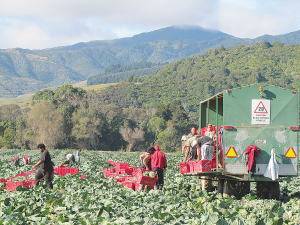Restrictions on fruits, vegetables movement in Mt Roskill
Legal controls on the movement of fruits and vegetables are now in place in Auckland’s Mt Roskill suburb, says Biosecurity New Zealand Commissioner North Mike Inglis.
 Ray Smith is urging the primary sector to remain vigilant and do the right things, so that when the season arrives they’ll be able to pick, pack and process products.
Ray Smith is urging the primary sector to remain vigilant and do the right things, so that when the season arrives they’ll be able to pick, pack and process products.
Don't drop your guard - with the Delta variant you're dealing with a much more serious strain of Covid.
That's the message to the primary sector from Ministry for Primary Industries (MPI) director general Ray Smith who told Rural News, from his home in Wellington last week, that the primary sector has handled the Covid crisis extremely well so far. He says things are running much more smoothly in the current lockdown and the different industries have been very organised, worked well with each other and stepped up and done the right thing.
But Smith warns that a lot of challenges lie ahead as the sector winds up for the busy time of year.
"Quarantine travel is still on the agenda for countries that supply RSE workers for the hort sector," he says.
"Most of the companies I have been talking to are well planned and well managed and are thinking about how to manage that workload through as the season comes on."
Smith says the focus, right now, should be on keeping all of the workers safe and keeping production and systems moving. He says it's about QR codes, bubbles, masks, TB temperature checks and social distancing where you can.
"These are the critical things that people need to do now, so that they don't lose their labour force as we go into the busy part of the season," he told Rural News.
"It's about being vigilant and doing the right things now, so that when the season arrives we'll be able to pick, pack and process products."
Getting vaccinated against Covid is important, says Smith, and he's urging all those in rural areas to find the nearest place to get their jabs. He says there are lots more vaccination stations in rural areas now.
He says MPI will be monitoring the situation to make sure that people in very isolated areas are not neglected in the vaccination programme.
Smith says an issue he's been asked about is what happens if a farmer, by some chance, contracts Covid.
He says farmers have been asking if they can self-isolate on their farms rather than go into quarantine.
"This is a health issue and it's up to the local medical officer of health to decide if a person needs to go into quarantine or not," Smith told Rural News.
"Almost all [Covid positive] New Zealanders, regardless of their circumstances, have to go into quarantine - so that is probably the likely starting point.
"The medical officer of health would look at the circumstances and make a decision."
Given that, Smith says, all farm operators, large or small, should have a back-up plan to deal with such a contingency. He concedes that for an owner-operator dairy farmer that would be very difficult, given that it's such a busy timme of the year, hence the need to have a plan in place.
He says MPI - along with all the various farmer groups - will be there to help and support that individual and their family.
"Farmers shouldn't be unduly worried, but they must make sure they have a back-up plan and the names of people who could potentially help them out," Smith says.
Shout Out For Sectors
Ray Smith believes the country recognises, values and trusts the efforts of all those working in the primary sector.
He says by putting in place good protocols and mechanisms - and sticking to them - the sector has demonstrated that it can handle itself well and has maintained its license to operate.
"Can I just say a huge thank you to every person who got up in the morning and went to work in the primary sector over the last few weeks and in the weeks to come. Thank you for doing your bit to keep us all healthy and well and keeping our exports moving to countries that need our food. And for helping to support our economy and keeping each other safe."
Smith says he'd like to especially single out the forestry and wood processing sectors who have had a "tough time" with the Covid lockdowns. He says these industries are a big part of the primary sector and contribute significantly to our export returns and the local economy.
Legal controls on the movement of fruits and vegetables are now in place in Auckland’s Mt Roskill suburb, says Biosecurity New Zealand Commissioner North Mike Inglis.
Arable growers worried that some weeds in their crops may have developed herbicide resistance can now get the suspected plants tested for free.
Fruit growers and exporters are worried following the discovery of a male Queensland fruit fly in Auckland this week.
Dairy prices have jumped in the overnight Global Dairy Trade (GDT) auction, breaking a five-month negative streak.
Alliance Group chief executive Willie Wiese is leaving the company after three years in the role.
A booklet produced in 2025 by the Rotoiti 15 trust, Department of Conservation and Scion – now part of the Bioeconomy Science Institute – aims to help people identify insect pests and diseases.